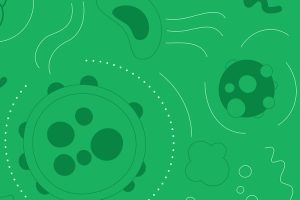Internal metric of space is influenced by geometry...
New Nature paper reveals that brain perceives distance differently depending on surroundings
Microbiome is one of most exciting areas of science today. By the microbiome I mean the community of microbes inside our bodies. These are 100 trillion bacteria and viruses that are responsible for many things, they are defensers in the body, they are key for our immune system, key for digesting our food, they are key for producing all the chemicals and hormones, and vitamins that keep us alive. What’s really interested me is how you can manipulate the microbiome, and how our diets have made us unhealthy.
I think we’re just beginning to realize that this is one of those exciting bits of us, that is a bit like genes that give us risk for disease, but unlike our genes, which are 99.9% the same, our microbiomes are only about 20% the same in everybody. Unlike our genes, we can very easily change our microbiome communities in just a couple of weeks. So, as well as being a great pointer to our health, because I can tell much more about anyone from looking at their poo sample, than I can can look at their DNA sample, it is much more precise estimate of health.
Why are junk foods and processed foods so bad for you? Because it could be the lack of fiber was causing this. The microbes need fiber, otherwise they starve. If you’re not giving them hard to digest fiber that goes into the colon, they’ve got nothing to eat, so they will die off. If you’re just getting fat and sugar, it gets absorbed early on in the gut.
How can you improve your gut microbes through diet? The first thing is fiber, it is really important to double the fiber levels, get above 20 or 30 grams a day. All of us in developed countries have too low fiber levels. When we’ve done experiments on our twins here at King’s College, we found that we can increase the diversity levels by doubling the fiber content in just a month. Often you can get these changes in a few weeks or a month. At the same time as we increase fiber, we often improve the amount of these beneficial microbes that were important for obesity and diabetes. It’s early days in these experiments. We’re finding that if we can combine high fiber intakes, we can reduce processed foods.
The evidence is now accumulating that beneficial effects of some diets can be explained by the microbes. The best example is the Mediterranean diet. We all know, that if you have that kind of diet, we’ll be healthier. One of the key things is they have lots of fruits and vegetables, they have variety of foods, they have dairy products, which contain live microbes probiotics, but they also have something called olive oil. Olive oil is the base of these Mediterranean diet. That has very high levels of different polyphenols that are microbes. So, by understanding our microbes we can start to understand the best guts that suit ourselves, and live health care lives.

New Nature paper reveals that brain perceives distance differently depending on surroundings

What to read about the major store of biological information in living organisms

New effective H7N9 and H5N1 vaccines will help to control the spread of viruses in avian species and, thus, to...